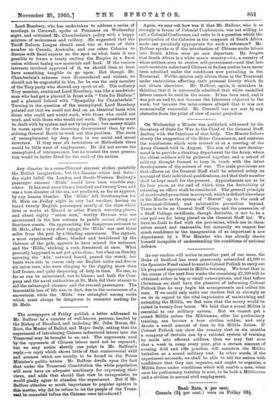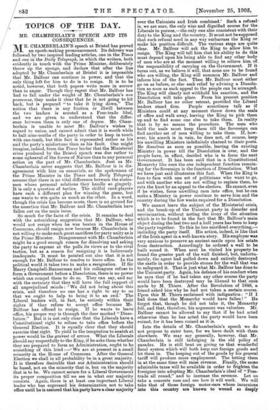Any disaster to a cross-Channel steamer strikes painfully the British
imagination; but the disaster which last Satur- day night befell the London and South-Western Railway's passenger steamer 'Hilda' would have been terrible any- where. It has cost more than, a hundred and twenty lives, and was a true disaster of the sea, not produced, so far as appears, by any human blunder. The 'Hilda' left Southampton for St. Maio on Friday night in very bad weather, having on board twenty English passengers, mostly of the class which lives or works at Dinard or other French watering-places, and, about eighty "onion men," worthy Bretons who are accustomed in the late autumn to peddle onions along our Southern coasts. On approaching the dangerous entrance to St. Maio, after a very slow voyage, the 'Hilda' was met three miles from the port by a blinding snowstorm. The captain, a. most experienced officer, blinded and bewildered by the violence of the gale, appears to have missed the entrance, and the 'Hilda,' striking a rock, foundered at once. What precisely happened is not yet quite clear; but when on Sunday morning the 'Ada,' outward bound, passed the wreck, her boats were able to rescue only one English sailor and five or six onion -men, who were clinging to the rigging more than half frozen, and quite despairing of help in time. No one, so far as can be ascertained, was to blame; and both the Com- pany and the naval authorities at St. Maio did their utmost to aid the submerged steamer and the rescued passengers. The lamentable loss of life was, in fact, due to the occurrence of a snowstorm while the 'Hilda' was entangled among rocks which must always be dangerous to steamers making for St. Malo.
The newspapers of Friday publish a letter addressed to Mr. Balfour by a number of well-known persons, headed by the Bishop of Hereford, and including Mr. John Burns, Mr. Burt, the Master of Balliol, and Major Seely, asking that the experiment of introducing Chinese indentured labour into the Transvaal may be brought to an end. The arguments used by the opponents of Chinese labour need not be repeated; but we may notice shortly one point in Mr. Balfour's reply,—a reply which shows little of that controversial skill and acumen which are usually to be found in the Prime Minister's public letters. Mr. Balfour dwells upon the fact that under the Transvaal Constitution the white population will soon have an adequate machinery for expressing their views, and adds that should that view be antagonistic, he would gladly agree to abandon the experiment. But if Mr. Balfour attaches so much importance to popular opinion in this matter, why did be refuse to let the people of the Trans- Thal be coneulted before the Chinese were introduced P Again, we may ask how was it that Mr. Balfour, who is so strongly in favour of Colonial Conferences, was not willing to call a Colonial Conference, and refer to it a question which the participation of the Colonies in the conquest of South Africa made one peculiarly appropriate for such a reference ? Mr. Balfour speaks as if the introduction of Chinese coolie labour into South Africa were no new departure. He forgets that South Africa is a white man's country—i.e., a country of white settlers soon to receive self-government—and that into such countries indentured Chinese or Indian coolies have never been admitted under the oonditions now prevailing in the Transvaal. Public opinion only allows them in the Transvaal under restrictions affecting their personal liberty which do not obtain elsewhere. Mr. Balfour, again, is mistaken in thinking that it is universally admitted that white unskilled labour cannot be used in the mines. It has been used, and it was put an end to, not because the labourers objected to the work, but because the mine-owners alleged that it was not economically successful. Mr. Creswell was not met by any obstacles from the point of view of racial prejudice.
On Wednesday a Minute was published, addressed by the Secretary of State for War, to the Chief of the General Staff, dealing with the functions of that body. The Minute follows closely the suggestion of the Esher Commission, and contains the conclusions which were arrived at at a meeting of the Army Council held in August. The aim of the new develop- ment is to provide a thinking department for the Army, where the ablest soldiers will be gathered together, and a school of military thought formed to keep in touch with the latest developments of the science of war. The main provisions are that officers on the General Staff shall be selected solely on account of their individual qualifications, and that their number shall be kept small for the present. Appointments are to be for four years, at the end of which time the desirability of retaining an officer shall be considered. The general principle of accelerated promotion is accepted, which is defined elsewhere in the Minute as the system of "Brevet" up to the rank of Lieutenant-Colonel, and substantive promotion beyond. There is to be no General Staff Corps, and the possession of a Staff College certificate, though desirable, is not to be a sine qua' non for being placed on the General Staff list. We have no fault to find with the provisions, which are in them- selves sound and reasonable, but naturally we cannot feel muoh confidence in the inauguration of so important a new department by a War Minister who has already shown himself incapable of understanding the conditions of national defence.
As our readers will notice in another part of our issue, the Duke of Bedford has most generously subscribed 21,000 to the Spectator Fund raised to enable Colonel Pollock to carry out his proposed experiment in Militia training. We trust that in the course of the next four weeks the remaining 21,500 will be obtained, either in big or small subscriptions, and that before Christmas we shall have the pleasure of informing Colonel Pollock that he may begin his arrangements and collect his men. If we could only make our readers feel as strongly as we do in regard to the vital importance of maintaining and extending the Militia, we feel sure that the money would be raised in twenty-four hours. We hold that a sound Militia is essential to our military system. But we cannot get a sound Militia unless the Militiaman, after his preliminary training, can become a true civilian soldier, and only devote a small amount of time to his Militia duties. If Colonel Pollock can show the country that in six months a company of recruits can by a rational system of training be made into efficient soldiers, then we may feel sure that a week in camp every year, plus a certain amount of evening drill and rifle practice, will maintain the Militia battalion as a sound military unit. In other words, if the experiment succeeds, we shall be able to tell the nation with confidence that they can organise, and ought to organise, a Militia force under conditions which will enable a man, when once his preliminary training is over, to be both a Militiaman and a civilian in normal civil employment.
Bank Bate, 4 Per cent. Consols (24 Per cent.) were on Friday 894.
• TOPICS OF _THE DAY.
MR. CHAMBERLAIN'S SPEECH AND ITS CONSEQUENCES..





















































 Previous page
Previous page